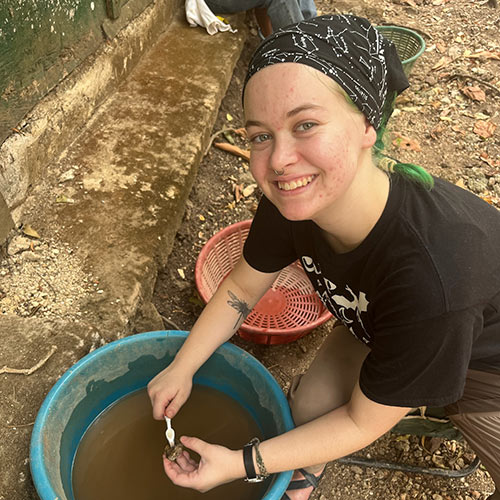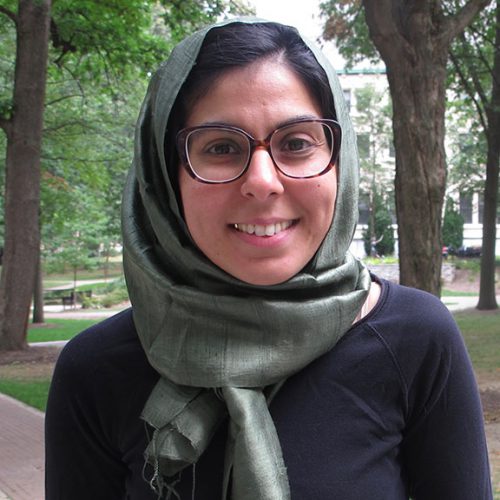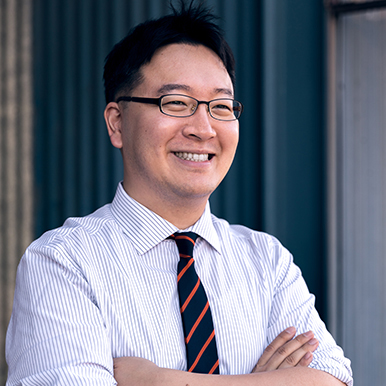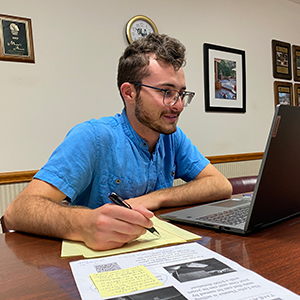
Archaeology and religious studies major builds hands-on skills through studying Maya ceramics
Teagan Knutson ’25, an archaeology and religious studies major at The College of Wooster, found the footing to thrive at a career in archaeology […]
With an academic environment that allows students to pursue a wide range of interests, religious studies students at The College of Wooster graduate with a diverse set of skills and pursue a wide range of careers. Our graduates have gone on to jobs in education and academia, politics, non-profit organizations, social work, and at libraries. A large percentage of students go on to graduate or professional schools, pursuing careers as counselors, administrators, clergy, physicians, nurses, or other public health professionals.
Religious Studies at Wooster is interdisciplinary because we believe the academic study of religion is best done by integrating multiple disciplinary perspectives,such as history, anthropology, sociology, political science, theology, philosophy, art history, literature, and languages. This makes the Religious Studies major or minor an excellent choice for any Wooster student with a broad spectrum of diverse but interlocking academic interests.
The College of Wooster recently launched its Pre-Ministry program which provides students a structure for discernment and fellowship with others who may be considering seminary, rabbinic school, graduate theological education, or religious vocations and study.
More Information on Pre-Ministry
Lincoln Chair of Religion; Associate Professor of South Asian Studies; East Asian Studies; Co-Liaison to the Museum & Archival Studies Pathway; Associate Dean of Academic Advising

Associate Professor and Department Chair of Religious Studies; Middle Eastern and North African Studies; South Asian Studies; Women's, Gender, & Sexuality Studies

Associate Professor of Religious Studies; Classical Studies; Department Chair of Middle Eastern and North African Studies

Administrative Coordinator - Africana Studies, Archaeology, East Asian Studies, Middle Eastern & North African Studies, Religious Studies, Sociology and Anthropology, South Asian Studies, Urban Studies, Women's, Gender, and Sexuality Studies

Teagan Knutson ’25, an archaeology and religious studies major at The College of Wooster, found the footing to thrive at a career in archaeology […]

Name: Tyler Rak Title: Crossing the Rubicon: Brazilian Water Access from Public Provision to Privatization Major: Political Science; history Minor: Religious studies; South Asian […]

At a time when violence is erupting across the globe, Alaina Cline ’25 participated in an inaugural gathering of young global leaders learning how […]

Tyler Rak ’24 spent his summer working as an intern for Lyric Theater of Wooster researching small theater operations, managing social media accounts, and […]
A Religious Studies major consists of 10.25 courses:
Other Major Recommendations
In addition, each Religious Studies major is encouraged to consider adding one of the following to their academic program: (a) a minor in a field appropriate to their professional and personal interests, or (b) an approved experiential learning opportunity appropriate to their professional and personal interests, or (c) a Pathway program appropriate to their professional and personal interests.
Special Notes
A Religious Studies minor consists of six courses:
Special Notes
Independent Study (I.S.) is an exciting and challenging prospect in Religious Studies. We take your ideas and interests in the study of religions seriously, and work closely with you through Junior and Senior I.S. to develop, implement, and complete research projects appropriate to your interests and to the field of Religious Studies.
Junior I.S. (normally completed in the Spring Semester of the junior year) includes a combination of seminar course work with other Religious Studies juniors and individual work with a faculty member in the department. Through these two approaches, you will develop an understanding of how to conduct research and writing in Religious Studies, and will complete a 20-25 page research paper of your own. The Junior I.S. experience will provide the foundation and preparation for the more in-depth and individualized work of Senior I.S.
Senior year you will work for two semesters on a larger I.S. research project — either a continuation of I.S. work performed junior year, or an entirely new project culminating in a paper of about 60 pages. This is the capstone experience for our majors. Guided by your adviser, you will conduct in-depth research, analyze diverse data, and learn how to make an original contribution to knowledge about religion.
I.S. in Religious Studies sharpens your ability to think creatively, critically, and empathetically, and teaches you how to express those thoughts clearly, in the form that scholars and professionals in the field use.
| Student | Year | I.S. Title | Major 1 | Major 2 | Advisor |
|---|---|---|---|---|---|
| Please search to view results | |||||
Name: Fiona Schieve Majors: Political Science, Religious Studies Advisors: Jeremy Rapport, Terry Reeder This project intends to analyze the overwhelming support Donald Trump garnered from […]
Name: Lark Pinney Major: Political Science (Comparative Politics concentration) Minor: Spanish, Religious Studies Advisor: Michele Leiby; Erum Haider (second reader) This study aims to […]
Name: Kevin Poe Major: Religious Studies, Philosophy Minor: South Asian Studies Advisors: Mark Graham, Elizabeth Schiltz In December of 2022 I traveled to Bodh […]
Name: Haley Huett Major: Political Science Minor: Religious Studies Advisors: Kent Kille, William Kujala Political leaders are sensitive to threat. Scholarship in the field […]
The Religious Studies department generally has between 30-40 majors. Each year we host a number of functions to bring faculty and students together for discussion, speakers, and research talks. Our students know one another and the faculty members well. Because Religious Studies majors are quite diverse in terms of their interests and backgrounds, after graduation they pursue a wide range of careers. Many of our majors become teachers/professors, political staffers, librarians/archivists, social workers, lawyers, counselors, administrators, pastors/youth leaders, physicians, web page designers.
Mark Bergen ’07, a technology reporter for Bloomberg News, published Like, Comment, Subscribe: Inside YouTube’s Chaotic Rise to World Domination, the first book to […]
Joy E. Bronson ’07 insisted from a young age that she wouldn’t be following in her father’s and grandfather’s footsteps as a pastor because […]
As a geologist for the United States Geological Survey, Kelli Baxstrom ’16 put much of the expertise learned from her time at The College […]
Christina Bowerman ’13 supports future City Year members including Keira Wright ’21
This prize honors the memory of J. Arthur Baird, Synod Professor of Religious Studies and a member of Wooster’s faculty from 1954 until his retirement in 1986. This prize is awarded annually to the student who, in the estimation of the Department of Religious Studies, has demonstrated the greatest aptitude in the area of New Testament studies.
This award was established in 1925 by Mrs. Mary Fine Twinem in memory of her husband, Paul D. Twinem, of the class of 1915, and is given at graduation to the senior who, in the opinion of the staff of the Department of Religious Studies, has shown the highest degree of excellence in Biblical studies.
The Dean’s List includes students meeting the following criteria during a semester: enrollment for at least four full credits in letter-graded courses, semester grade point average of 3.650 or higher, no final grade of I (Incomplete) or NC (No Credit). Students who demonstrate satisfactory progress in 451 or completion of 452 are eligible for the Dean’s List with three courses which are letter-graded.
Departmental Honors are awarded at graduation to students who meet the following standards: (1) a grade of “H” on the Senior I.S. Thesis or unanimous vote of the department; (2) an average of 3.5 in all courses taken in the major department; (3) an overall average of 3.2 for four years at Wooster.
Latin Honors, first awarded in 1998, are awarded at graduation based on overall grade point average in Wooster-graded courses: summa cum laude for 3.900 to 4.000; magna cum laude for 3.750 to 3.899; and cum laude for 3.500 to 3.749. To graduate summa cum laude, a student must receive a grade of “H” on the Senior I.S. Thesis. Latin Honors are not a substitute for Departmental Honors.
Phi Beta Kappa, the oldest national society for the recognition of high scholarship, has a chapter, the Kappa of Ohio, at Wooster. The student membership is made up of those seniors who are first in academic rank, a few being elected at the beginning of the senior year on junior standing, and others at the end of the year.
The Religious Studies Department, along with RSL, invites the campus community to attend the 53rd Annual Fall Academy of Religion Lecture series. This year’s theme is “The Changing Religious World.” Many people associate religion with tradition. Religious communities maintain critical beliefs and practices that unite people in meaningful communities across time. But they can, and frequently do, change. Like an any social organization, religious groups can change to accommodate the surrounding culture, they can change to better fit their members desires or interests, or they change due to outside pressures forcing them to change.
In this lecture series, members of The College of Wooster Religious Studies faculty, Wooster students, and a panel of local religious leaders will examine various aspect of change in religious traditions, exploring questions such as: